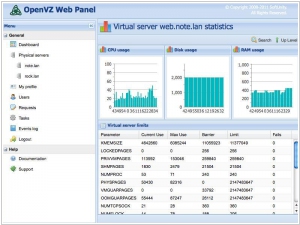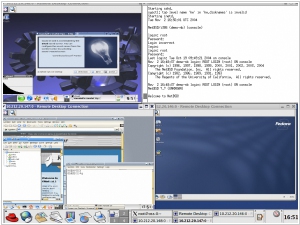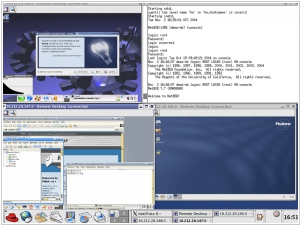OpenVZ vs Xen
July 23, 2023 | Author: Michael Stromann
6

OpenVZ is container-based virtualization for Linux. OpenVZ creates multiple secure, isolated Linux containers (otherwise known as VEs or VPSs) on a single physical server enabling better server utilization and ensuring that applications do not conflict. Each container performs and executes exactly like a stand-alone server; a container can be rebooted independently and have root access, users, IP addresses, memory, processes, files, applications, system libraries and configuration files.
OpenVZ and Xen are both virtualization technologies, but they employ different approaches and cater to distinct use cases. OpenVZ is an operating system-level virtualization platform that utilizes the Linux kernel to create isolated containers, known as Virtual Private Servers (VPS). These containers share the same kernel as the host system, which allows for efficient resource utilization and lightweight virtualization. OpenVZ is ideal for scenarios where a large number of lightweight virtual environments need to be deployed on a single host, making it popular for web hosting and small-scale virtualization setups. On the other hand, Xen is a hypervisor-based virtualization technology that operates at a lower level, enabling the creation of fully isolated virtual machines with their own independent kernels. This approach ensures greater isolation between VMs but may require more resources compared to OpenVZ. Xen is well-suited for more demanding and resource-intensive workloads, providing a versatile solution for enterprise-level virtualization needs, including cloud computing environments and data centers.
See also: Top 10 Virtualization platforms
See also: Top 10 Virtualization platforms
OpenVZ vs Xen in our news:
2007. Citrix to buy virtualization company XenSource

Citrix, a leading provider of thin client software for delivering business applications from servers to desktop computers, has recently completed the acquisition of XenSource, an open-source virtualization company, for approximately $500 million. This strategic move enables Citrix to expand its presence into the server and desktop virtualization market. XenSource offers a powerful open-source "hypervisor" software called Xen, which enables a single computer to simultaneously run multiple operating systems. This technology is particularly beneficial for replacing traditional servers with a more efficient, consolidated computing solution. XenSource's commercial offering, XenEnterprise, is built upon the Xen software platform. Virtualization has emerged as a highly sought-after technology in the IT industry as it empowers corporate customers to optimize their computing resources by consolidating numerous computing tasks onto fewer physical machines. Notably, VMware, the current market leader in virtualization, recently went public, experiencing a significant surge in its stock price, rising from $29 (its offering price) to $51.




